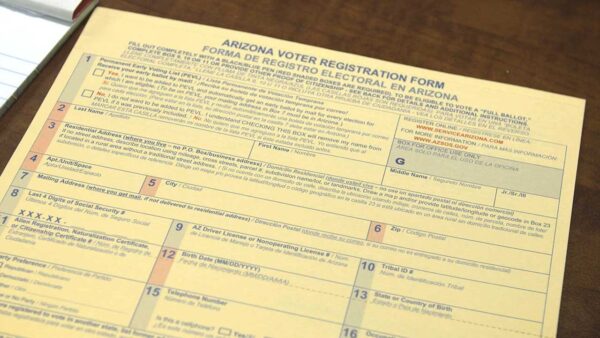Voting Rights Groups File Amicus Brief to Protect Arizona’s Eligible Voters from Documentary Proof of Citizenship Law
The League of Women Voters of the United States, League of Women Voters of Arizona, Secure Families Initiative, and Modern Military Association of America filed an amicus brief this week in Mi Familia Vota v. Fontes, a case before the U.S. Court of Appeals for the Ninth Circuit.
That lawsuit challenges Arizona’s H.B. 2492, a 2022 law that prohibits Arizonans who register to vote without submitting documentary proof of citizenship (e.g., a birth certificate or a passport) from voting for president in any federal election — a provision that was in September 2023. Arizona already requires voters to register with documentary proof of citizenship for state elections.
In their amicus brief, the groups respond to a groundless theory put forth by Arizona legislators and the Republican National Committee that Congress does not have the authority to oversee presidential elections, thus, the Arizona Legislature would be free to require documentary proof of citizens for Arizonians voting for president.
The brief notes that history and precedent show that the Elections Clause, the Necessary and Proper Clause, and the Fourteenth and Fifteenth Amendments of the U.S. Constitution empower Congress to regulate presidential elections, and the Arizona Legislature cannot strip Congress of that authority.
The courts have consistently ruled against these numerous attempts by Arizona legislators to implement a documentary proof of citizenship requirement for federal elections, including the U.S. Supreme Court in 2013 and the U.S. District Court for the District of Arizona, which struck down a number of provisions in H.B. 2492.
Separately, the Republican National Committee and Arizona legislators recently filed an emergency motion with the U.S. Supreme Court asking to revive the law by claiming Congress does not have the authority to regulate presidential elections. Changing Arizona’s long-standing voter registration practices in advance of the fast-approaching 2024 election would inject chaos and confusion into the process.
The amicus brief makes clear that implementation of H.B. 2492 would only cause extreme confusion about voter registration in Arizona and lead to eligible voters in Arizona being disenfranchised because they would be prohibited from voting in presidential elections. This law is an attack on the National Voter Registration Act and one of the latest of many attempts to disenfranchise eligible voters in Arizona by making it harder to register to vote.
Amici are represented by the American Civil Liberties Union, ACLU of Arizona, Brennan Center for Justice at NYU Law, Dēmos, and pro bono counsel at Keker, Van Nest & Peters LLP.
The following comments are from amici:
“Arizonans need to know that H.B. 2492 is an intimidation tactic,” said Pinny Sheoran, president of the League of Women Voters of Arizona. “Requiring proof of citizenship, a solution in search of a problem, will allow the state to further suppress voters, especially voters of color. There is no reason to make voter registration more difficult by not allowing voters to use the state form to register for federal-only elections. LWV Arizona will continue to stand up for voters and fight laws that do not serve the best interest of Arizona voters.”
“There is no evidence that noncitizens vote in federal elections, so laws like H.B. 2492 are completely unnecessary,” said Celina Stewart, CEO of the League of Women Voters of the United States. “Requiring proof of citizenship severely burdens the right to vote in many communities, and removing presidential elections from the protections of the NVRA would create chaos and new avenues to disenfranchise voters across the nation. The League will not stand for laws that disenfranchise voters from making their voices heard.”
“The legal theory being presented in this case threatens military families’ ability to irrevocably participate in the very democracy we serve to protect,” said Sarah Streyder, executive director of Secure Families Initiative. “It took decades for our community — 50% of whom are voters of color — to fight for and earn these crucial federal protections, which protect us no matter where in the world the military sends us.”
“Military service members and their families face unique challenges when registering to vote and voting which translates to lower turnout when compared with civilian voters,” said Rachel Branaman, executive director of Modern Military Association of America. “As state legislation pose direct challenges to the lives and liberties of military families, it’s imperative that eligible military voters and their families do not face additional voting barriers. There are almost 50,000 active-duty service members and family members living in Arizona and countless Arizona natives serving out of state who would potentially be disenfranchised by a change to voter registration practices.”
Amicus brief is here.
Case background: /cases/mi-familia-vota-v-fontes-amicus




